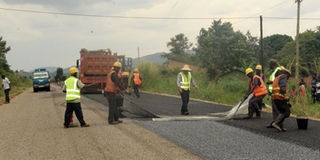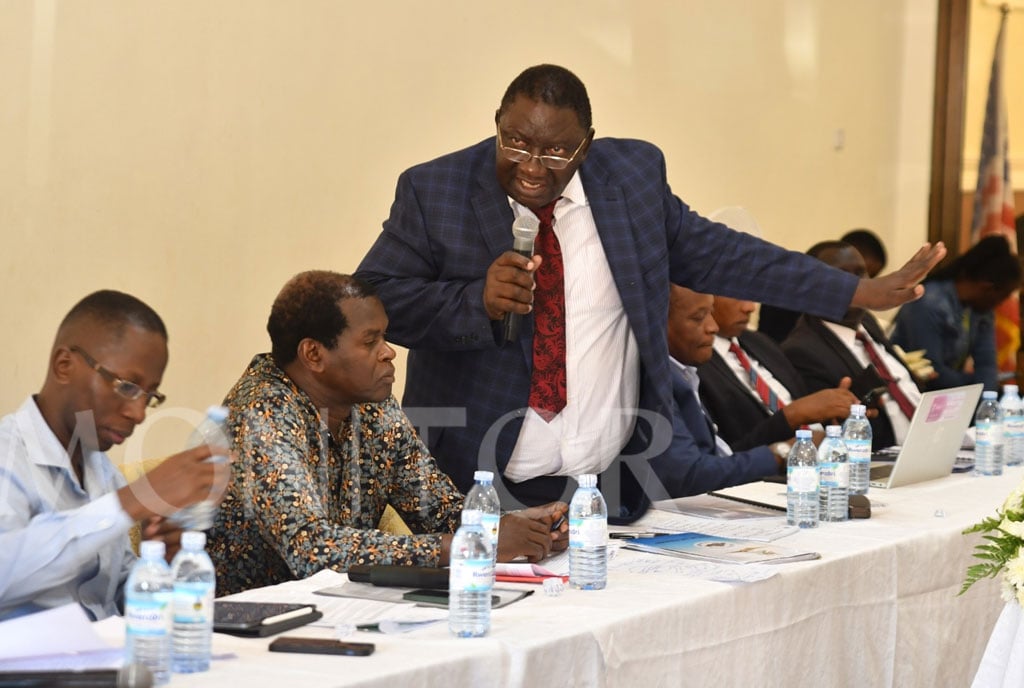Ugandans tap into Chinese expertise

Construction of the Kigumba-Kyenjojo road. Photo by Francis Mugerwa
What you need to know:
- In March 2015, the Auditor General, Mr John F.S Muwanga released a value for money audit on the implementation of the local content in the oil and gas sector which detailed employment and business concerns of Ugandans about the petroleum sector.
- Mr Omiat Gabrel participated in a wielding competition that was organized by China communications construction company (CCCC) that is constructing the Kampala-Entebbe Express Way.
Hoima
It is a sunny morning and a young man is seen squatting, holding a trowel in his right hand as he plasters cement on a drainage that is being constructed along the Kigumba-Kyenjojo road.
Rogers Abigaba, 24, is among the over 450 Ugandans who are working on one of the ten critical roads that are being constructed by the Ugandan government to facilitate commercial oil development. Government projects oil production to commence in 2020.
The 238-kilometre Kigumba-Masindi-Hoima-Kyenjojo road connects Northern Uganda to western Uganda. It also links Uganda to Democratic Republic of Congo (DRC) and South Sudan.
China Railway No.5 Engineering Group Company Ltd is tarmacking the Bulima-Kabwooya section of the road while the Kabwooya-Kyenjojo section of the road is being tarmacked by Shengli Engineering construction Group Ltd, a Chinese firm. The two Chinese firms are upgrading the murram road to bitumen standard.
Abigaba is among the workers who have attained basic construction skills from the Chinese contractors.
Skills
Some Ugandan youth have been taught to operate graders, caterpillars, sand mixers and other construction equipment on the roads.
“There are many locals who have attained skills and experience from the Chinese expatriates,” says Hosia Mbusa, the Humna resource officer for China Railway No. 5 Ltd.
Upon being recruited, locals are handed to Chinese supervisors to test and upgrade their skills.
“Some are recruited as drivers but they are taught mechanics. Others are recruited as spanner men but they get training in basic mechanical engineering,” he adds.
A 25-year old Oscar Babiihe joined China Railway No 5 as a fresh graduate of Business Administration from Kampala University.
“I joined here as an office assistant. However, I attained skills on job which convinced my superiors to elevate me to a position of deputy human resource officer,” Babiihe says.
Protests
However, many youths who are unemployed keep hanging around the Chinese construction projects, the Hoima Resident District commissioner Mr Stephen Ekoom says.
“As a district security committee, we have directed the contractors to put up grievance handling mechanisms so that we minimize conflicts that may arise between the communities and contractors,” Ekoom says.
Some locals accuse the Chinese workers of sidelining them during the recruitment process.
“I have been coming to this camp for the past three weeks but I’m yet to get a job,” says John Asiimwe, a 22-year old resident of Hoima town says.
Police recently was called in to quell an uprising from locals who were protesting exclusion from the jobs.
The Hoima District labour officer, Mr Anthony Ayesiga says the youth who have secured jobs among Chinese contractors have improved on their incomes. However, the number of youth who are yearning for employment is overwhelming, Ayesiga says.
Every week, Hoima District local government receives an average of 100 youth seeking employment, the district chairperson Mr Kadiri Kirungi says.
Uganda National Roads Authority’s project manager for the Kigumba-Bulima road Mr Edmond Mugisha acknowledges that many youth are yearning for employment at the road construction sites.
“The contractors want to employ people with at least basic skills so that they upgrade while on job. It slows down the work rate of a contractor if he employs people who lack any skill.I urge existing vocational training institutions in this (Bunyoro) region to train more skilled people who can tap into the ongoing and upcoming construction projects,” he says.
Government has kicked off the construction of ten roads in Bunyoro Sub-region that will facilitate commercial oil development.
Over 600 kilometres of murram roads will be upgraded to tarmac within three years, according to Uganda National Roads Authority (UNRA).
Trainings
As other youth struggle to access employment opportunities, there are Ugandans who have received specialised trainings from the Chinese Government and Chinese firms.
Over 70 Ugandan students were recently supported by China National Offshore Oil Corporation (CNOOC) Uganda Ltd to pursue vocational courses in the oil-rich Hoima District.
CNOOC Uganda Ltd, a Chinese oil firm that was contracted to develop the Kingfisher oil field in the Albertine graben injected $50,000 (about Shs131 million) in the training programme.
The students attained certificates in welding and metal fabrication, carpentry and joinery, plumbing, cosmetology, bricklaying and concrete practice and electrical installations.
It is projected that such skilled personnel can tap into unfolding opportunities in Uganda’s oil and gas industry.
Wycliffe Tumusiime, 28, who attained a certificate in plumbing at Nile Vocational institute, gets contracts from individuals and entities in Bunyoro Sub-region.

A Chinese expatriate directs Ugandan workers during the tarmacking of the Kigumba-Kyenjojo road. Photo by Francis Mugerwa
Tumusiime, a father of one estimates his monthly income to be over Shs1 million which he uses to look after his family and save for investment.
Mathias Kisembo who dropped out of school in 2008 after failing to raise school fees says the training has enabled him to be self-employed.
Kisembo who was found at a construction site Hoima town installing water pipes at a newly constructed residential house, attained a plumbing certificate at Nile Vocation institute in 2013.
“The programme was designed to reach out to school dropouts who for different reasons failed to attain further education in higher learning institutions,” says Zachariah Lubega, CNOOC Uganda’s Corporate Social Responsibility Manager.
Challenges of oil skills
Mr Jackson Wabyoona, the chairperson of Bunyoro Local oil and gas advocacy Group (BULOGA), believes that the trainings of youth in certificate courses underscores a huge challenge which Uganda faces in developing the skilled workforce in Uganda’s oil industry.
Producing a petroleum engineer requires over eight years of training, Wabyoona, an educationist says.
Giving youth some certification is a good start but it shows how we need a proactive approach in sustainably developing the human resource sector that will develop Uganda’s oil sector, he adds.
The struggle by Ugandans to attain the required skills and employment in the country’s oil sector has been an uphill one.
In March 2015, the Auditor General, Mr John F.S Muwanga released a value for money audit on the implementation of the local content in the oil and gas sector which detailed employment and business concerns of Ugandans about the petroleum sector.
In his report which he submitted to parliament, Muwanga observed that overall the proportion of Ugandans employed in the oil and gas sector by the oil companies rose from 69% in 2012 to 80% in 2014.
Although CNOOC had increased the total number of employees recruited over the years from 91 to 123, Total E&P Uganda and Tullow Uganda Operations Pty Ltd had reduced their total workforce over the years.
The oil companies explained that the reduction was attributed to reduced levels of activities due to delayed approvals by government, of their production licenses.
“Government has not set targets for the number of Ugandans to be employed by the oil companies over time. Without set measurable targets, it is not clear whether the levels of employment are on course with Government’s recruitment programme for Ugandans in the oil and gas sector,” Muwanga said.
“While there has been a general increase in the level of employment of Ugandan Nationals, there is still a low concentration of Nationals in senior management and middle management,” Muwanga added.
Since 2014, CNOOC Uganda in partnership with the Chinese Embassy in Uganda offered scholarships to eight Uganda students in petroleum courses.
The courses include a Bachelor’s degree in petroleum Engineering and Master’s degrees in Oil and Gas Well Engineering and Gas Field Development.
“The Master programme takes three years and the Degree program takes four years at the China University of Petroleum,” says Aminah Bukenya CNOOC Uganda’s Public relations supervisor.
The Chinese form has offered international certifications for its Ugandan staff and technical placement overseas.
Fifteen Ugandans have also been included in a team of oil Engineers that are in China designing the Front End Engineering Design (FEED) for the Kingfisher oil field.
Support
The Chinese Government has supported Uganda to develop human resource through grant projects, technical assistance projects, training courses, seminars and scholarships, the Chinese Embassy in Uganda said.
This year, more than 500 Ugandans were sent to China for short term training courses and seminars, said Lin Xin, an Economic officer at the Chinese Embassy in Uganda.
With the support from China, government has kicked off the Uganda Industrial skills training and production center project.
“It is intended to introduce modern methods and practices for machining and manufacturing,” Xin said.
Under the China-Uganda Cooperation project, China dispatched agricultural experts to teach Ugandan farmers in promoting horticulture, cereals, aquaculture, livestock, food process and cross-cutting technologies.
Through the promotion of the Chinese Rice cultivation technology, the Chinese have also donated equipment and constructed Kibimba Rice Scheme and Doho Rice Scheme.
The Chinese companies in Uganda hired around 40,000 Ugandans, the Chinese Embassy said.
According to the embassy, Ugandans working in Chinese companies are mainly in engineers, lab technicians, bar placers, engineering machinery operators, mechanics, electricians, plumbers, masons, carpenters, safety officers, foremen, human resource, marketing, environmental and IT officers.
Mr Omiat Gabrel participated in a wielding competition that was organized by China communications construction company (CCCC) that is constructing the Kampala-Entebbe Express Way.
He won the first-place prize and he was recruited into the company where he has worked for three years.
“I got training from the Chinese technicians. Am now a senior electro welder who can complete all kinds of welding work independently,” says Omiat.
He has since opened his own electro welding shop much as he continues working with CCCC.
The story was sourced with a grant from the Africa-China reporting Project managed by the Journalism department of the University of Witwatersrand.




